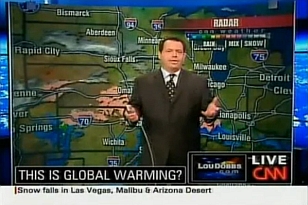 Just a few months ago, we learned that one out of four weathercasters surveyed [PDF] thought global warming wasn’t really happening, and another 21 percent weren’t sure yet. Now a new survey [PDF] reveals that 21 percent of TV news directors don’t think climate change is real, and 26 percent are unsure.
Just a few months ago, we learned that one out of four weathercasters surveyed [PDF] thought global warming wasn’t really happening, and another 21 percent weren’t sure yet. Now a new survey [PDF] reveals that 21 percent of TV news directors don’t think climate change is real, and 26 percent are unsure.
Bottom line: Almost half of the people determining what you hear — or don’t hear — about climate change on local TV news don’t actually believe climate change is happening.
Add just a pinch of science: This latest survey — conducted, like the earlier one, by the George Mason University Center for Climate Change Communication — shows that the TV newsrooms of America aren’t exactly havens of scientific discourse. Only 10 percent have a full-time science or environmental reporter, which means that the job often falls to the person who points to cold fronts on colorful maps. And despite the overwhelming recognition by top climate scientists that global warming is human-caused, 90 percent of the news directors said their coverage of climate change must reflect a “balance” of viewpoints.
You’re not the boss of me: Weathercasters playing the role of resident scientists is a knotty subject, one that Grist’s Jonathan Hiskes and Charles Homans, writing for the Columbia Journalism Review, tackled recently. Here’s Homans:
[S]triking is the fact that the weathercasters became outspoken in their rejection of climate science right around the time the rest of the media began to abandon the on-the-one-hand, on-the-other-hand approach that had dominated their coverage of the issue for years, and started to acknowledge that the preponderance of evidence lay with those who believed climate change was both real and man-made. If anything, that shift radicalized the weathermen. “I think the media is almost sleeping with the enemy,” one meteorologist told me. “The way it is now, there is just such a bias as to what gets out.”
I am blogger, hear me roar: Andrew Freedman, a member of The Washington Post‘s Capital Weather Gang, blames the blogosphere — or, more specifically, the fact that a number of big-name meteorologists have found second careers there as climate skeptics:
In my view, the perception that there is significant scientific disagreement about the causes of climate change can be traced in part to the rise of the blogosphere as a medium of scientific communication (and misinformation). Climate skeptics dominate this medium, and many are current or former weather forecasters, such as former TV meteorologist Anthony Watts of the popular “Watts Up With That” blog, and Joe D’Aleo, who runs icecap.us.
He’s mad as hell: The weathercaster-as-skeptic meme really picked up steam in late 2007 when John Coleman, longtime San Diego meteorologist and cofounder of The Weather Channel, issued what’s become a denier’s manifesto. Here’s his opening salvo:
It is the greatest scam in history. I am amazed, appalled and highly offended by it. Global Warming; It is a SCAM. Some dastardly scientists with environmental and political motives manipulated long term scientific data to create an illusion of rapid global warming. Other scientists of the same environmental whacko type jumped into the circle to support and broaden the “research” to further enhance the totally slanted, bogus global warming claims. Their friends in government steered huge research grants their way to keep the movement going. Soon they claimed to be a consensus.
We have so much to give: Attempts are being made to bridge the climate chasm — check out a CBS News report on weathercasters taking global-warming classes. But scientists are starting to realize that they need to make more of an effort to dispel the notion that they are a secret society. As Jeff Tollefson writes at Nature.com:
Scientists are … trying to take a proactive approach, designed to counter charges that they are a cabal that won’t share data and that blocks dissenting views. Ralph Cicerone, president of the U.S. National Academy of Sciences, says that the climate-science community must find ways to open up.
Too much information: The sad truth is that sharing science won’t necessarily bring people over from the dark side. Chris Mooney, writing in The Washington Post, points to research showing that Republicans who are college graduates are less likely to accept the scientific consensus on climate change than Republicans with less education:
[I]t appears that politics comes first on such a contested subject, and better information is no cure-all — people are likely to simply strain it through an ideological sieve. In fact, more education probably makes a global warming skeptic more persuasive, and more adept at collecting information and generating arguments sympathetic to his or her point of view.
Sometimes more is less.



